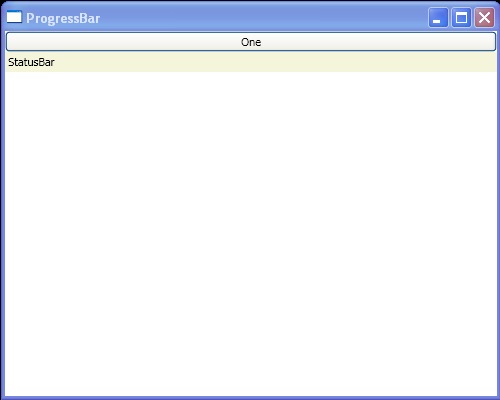Create a ProgressBar.

<Window xmlns="http://schemas.microsoft.com/winfx/2006/xaml/presentation"
xmlns:x="http://schemas.microsoft.com/winfx/2006/xaml"
x:Class="ProgBar.Window1"
Title ="ProgressBar"
Width="500">
<StackPanel>
<Button Content="One" Click="MakeOne"/>
<StatusBar Name="sbar" Grid.Column="0" Grid.Row="5" VerticalAlignment="Bottom" Background="Beige" >
<StatusBarItem>
<TextBlock>StatusBar</TextBlock>
</StatusBarItem>
</StatusBar>
</StackPanel>
</Window>
//File:Window.xaml.cs
using System;
using System.Windows;
using System.Windows.Controls;
using System.Windows.Controls.Primitives;
using System.Windows.Data;
using System.Windows.Documents;
using System.Windows.Media;
using System.Windows.Media.Animation;
using System.Windows.Media.Imaging;
using System.Windows.Shapes;
namespace ProgBar
{
public partial class Window1 : Window
{
private void MakeOne(object sender, RoutedEventArgs e)
{
sbar.Items.Clear();
Label lbl = new Label();
lbl.Background = new LinearGradientBrush(Colors.LightBlue, Colors.SlateBlue, 90);
lbl.Content = "ProgressBar with one iteration.";
sbar.Items.Add(lbl);
ProgressBar progbar = new ProgressBar();
progbar.IsIndeterminate = false;
progbar.Orientation = Orientation.Horizontal;
progbar.Width = 150;
progbar.Height = 15;
Duration duration = new Duration(TimeSpan.FromSeconds(10));
DoubleAnimation doubleanimation = new DoubleAnimation(100.0, duration);
progbar.BeginAnimation(ProgressBar.ValueProperty, doubleanimation);
sbar.Items.Add(progbar);
}
}
}
Related examples in the same category